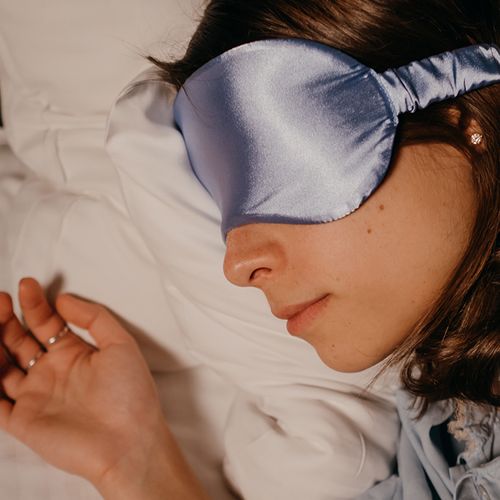Most people assume that lack of sleep is more of an annoyance than a legitimate threat to their health. But that's a mistake. Lack of sleep-even if it's only occasional-is directly linked to poor health. If ignored, sleep problems can increase your risk for diabetes and heart disease.
About two out of every three Americans ages 55 to 84 have insomnia, but it is one of the most underdiagnosed health problems in the US Even when insomnia is diagnosed, many doctors recommend a one-size-fits-all treatment approach often including sleep medication) that does not correct the underlying problem.
Everyone should have a comfortable mattress.. keep the bedroom cool (about 68°F to 72°F)...and dim or tum out the lights (production of the sleep hormone melatonin can be inhibited in the presence of light). Keep TVs and computers out of the bedroom-both can be stimulating, rather than relaxing. But these basic steps may not be enough.
To treat specific sleep problems…
If You Wake Up Too Early In The Morning
Early risers often have advanced sleep phase syndrome (ASPS), seen most commonly in older adults. With this condition, a person's internal body clock that regulates the sleep-wake cycle (circadian rhythm) is not functioning properly. ASPS sufferers sleep best from 8 pm to 4 am.
My solutions: Reset your circadian rhythm with a light box a device that simulates natural light with lightbulbs). They don't require a doctor's prescription and are available for $100 to $500 online or from retailers, such as Costco. Most use a light box for 30 minutes to an hour daily at sundown. (Those with ASPS may need long-term light therapy. If you have cataracts, glaucoma or a mood disorder (such as bipolar disorder), consult your doctor before trying light therapy. Patients with retinopathy should avoid light therapy.
Also helpful: To help regulate your internal clock so that you can go to bed (and get up later, take a 3-to 5-milligram (mg) melatonin supplement each day. A sleep specialist can advise you on when to use light therapy and melatonin.
If You Can’t Stay Asleep
Everyone wakes up several times a night, but most people fall back to sleep within seconds, so they don't remember waking up.
Trouble staying asleep is often related to sleep apnea, a breathing disorder that causes the sufferer to awaken repeatedly during the night and gasp for air. Another common problem among those who can't stay asleep is periodic limb movement disorder (PLMD), a neurological condition that causes frequent involuntary kicking or jerking movements during sleep.
My solutions. If you are unable to improve your sleep by following the strategies already described, consult a sleep specialist to determine whether you have sleep apnea or PLMD.
Sleep apnea patients usually get relief by losing weight, if necessary...elevating the head of the bed to reduce snoring...using an oral device that positions the jaw so that the tongue cannot block the throat during sleep...or wearing a face mask that delivers oxygen to keep their airways open. PLMD is usually treated with medication.
If You Can’t Get To Sleep
Most people take about 20 minutes to fall asleep, but this varies with the individual. If your mind is racing due to stress (from marital strife or financial worries, for example) or if you've adopted bad habits (such as drinking caffeine late in the day), you may end up tossing and turning.
My solutions: Limit yourself to one cup of caffeinated coffee or tea daily, and do not consume any caffeine-containing beverage or food (such as chocolate) after 2 pm. If you take a caffeine-containing drug, such as Excedrin or some cold remedies, ask your doctor if it can be taken earlier in the day.
*To find a sleep center near you, consult the American Academy of Sleep Medicine (708-492-0930, www.sleep centers.org).
Helpful: If something is bothering you, write it down and tell yourself that you will deal with it tomorrow
Also helpful: At night, turn the clock face away from you so you don't watch the minutes pass. If you can't sleep after 20 to 30 minutes, get up and do something relaxing, such as meditating, until you begin to feel drowsy.
If You Can’t Get Up In The Morning
If you can't drag your head off the pillow, sleep apnea or a delayed sleep phase (DSP) disorder might be to blame. DSP disorder makes it hard to fall asleep early, so you stay up late and then struggle to get out of bed in the morning.
My solutions: To treat DSP disorder, progressively stay up for three hours later nightly for one week until you reach your desired bedtime. By staying up even later than is usual for you, you'll eventually shift your circadian rhythm. Once you find your ideal bedtime, stick to it. Also consider trying light-box therapy each morning upon arising Light helps advance your body clock so that your bedtime should come earlier. Taking 3 mg to 5 mg of melatonin one hour before bedtime should also make you sleepy at an earlier hour.
If You Can’t Stay Awake During The Day During The Day
If you're getting ample rest-most people need seven and one-half to eight hours a night and are still tired, you may have narcolepsy. This neurological disorder occurs when the brain sends out sleep-inducing signals at inappropriate times, causing you to fall asleep and even temporarily lose muscle function. Sleep apnea or periodic limb movements also can leave people feeling exhausted.
My solutions: Figure out how much sleep you need by sleeping as long as you can nightly (perhaps while on vacation) for one to two weeks. At the end of that period, you should be sleeping the number of hours you need. Give yourself that much sleep time nightly. If you remain sluggish, ask your doctor about tests for sleep apnea, PLMD-or narcolepsy, which is treated with stimulants, such as modafinil (Provigil), that promote wakefulness.
